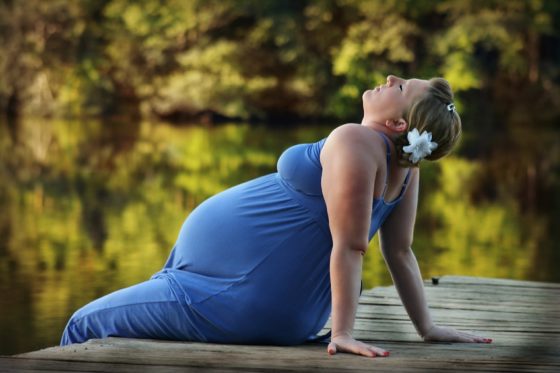Older Mom? Your Baby Might be Smarter
It turns out hitting “snooze” on your biological clock might not be a bad idea after all. If you’ve been waiting until your 30s to have kids, new research shows that being an older mom might make your child smarter.
Generally, the ideal age to give birth is between age 25-30 for a variety of reasons, including health of the mother and child. But a new study published in the International Journal of Epidemiology says that children born to mothers age 35 and older are more likely to perform better in cognitive ability tests than those born to younger mothers.
As more women today are delaying marriage and children, the study found they tend to have a few other advantages over younger moms. For one, an older mom probably has a good hold on her career and is well educated, and she
The study included data from three longitudinal studies in the UK — one in 1958, another in 1970, and the final one in 2001. Children’s cognitive ability was tested when they were 10 or 11 years old. Those born to mothers aged 25-29 in the earlier studies scored higher than children born to mothers aged 35-39; however, those results were flipped by 2001.
Researchers, taking the mothers’ social and economic characteristics into account when analyzing the data, gave the changing characteristics of women who have children at an older age as the likely reason for the differences.
How many women in their 30s are having babies?
Nearly 4 million babies are born in the United States each year. According to the latest statistics available from the Centers for Disease Control and Prevention (CDC), birth rates dropped in 2015 to record lows among women under age 30 but rose for those aged 30-44 — a trend observed for three decades now. This decline followed an increase of births in 2014, the first year there was an increase since 2007. The general fertility rate also is down 10% since 2007 across all race and origin groups, while the pre-term birth rate rose for the first time since 2007.
Teenage birth rates have continued to decline, falling 8% (22.3 births per 1,000 women), while rates for women aged 20-24 fell 3% (76.8 per 1,000), and aged 25-29 decreased 1% (104.3 per 1,000). Fewer teens have been having babies since 2007 — a 46% birth rate decline over the past decade — while the birth rates for women aged 30-44 rose from 2014 to 2015.
Women aged 30-34 recorded a 1% birth rate increase in 2015 (101.5 births per 1,000 women), while the birth rate for women aged 35-39 increased 2% (51.8 births per 1,000 women), and 4% for women aged 40-44 (11 births per 1,000 women).
Since 2007, though, the largest increase in birth rates among all age groups was mothers aged 40-44 — up 15%. Meanwhile, woman aged 35-39 saw a 9% increase and those aged 30-34 saw a 1% increase.
When is the best time to have your first child?
According to the CDC, the average age for a woman in the U.S. giving birth to her first child is about 26. While having a baby after age 30, 35, and 40 is becoming more common, there’s conflicting advice on the best age to give birth to your first.
The aforementioned UK studies detail benefits of waiting until 35, when you’re more settled, while additional research from the past decade also has indicated the positives of being an older mom — and not just for immediate health reasons. Older moms could eventually live longer and earn more money than younger first-time moms.
Research from 2004 by a sociologist at the University of Texas at Austin discovered a relationship between women’s health and mortality risk to parenthood and age at first birth. The study, drawn from U.S. women aged 25 or older with a mortality follow-up eight years later, found that waiting until your late 20s or early 30s had the best health outcomes for both mother and child.
Many women in the study who were going to college were delaying their first birth until age 30, about 12 to 14 years after the end of puberty. Although women’s reproductive systems are at peak function a year or two after adolescent growth, a high level of health problems were found with women who gave birth shortly after or during puberty. The longer a first birth was delayed, up to about age 34, the fewer health issues there were — though they began to rise steeply again after about age 40.
Having a baby later in life also can help women earn more over the lifetime of their careers, and thus possibly increase their ability to support their child. According to a study by Washington University in St. Louis, women who delay childbirth until after age 31 earn more over their entire careers than women with no children, while those who delay until age 37 add about a half-year of salary to their lifetime earnings.
See also: Pregnancy Problems: Early Warning Signs
What are the risks of being an older mom?
While fewer health problems, more money, and smarter kids sounds great, there also are risks associated with waiting to have your first child. For one, fertility starts to drop through your mid-30s, then much faster after age 35. Fertility drugs can be expensive, and trying to get pregnant when you’re older can put a lot of stress on your mind and body.
Many doctors focus on pregnancy risks after age 40, so be sure to keep the following in mind if you do decide to hold off or you have a hard time becoming pregnant until you’re older.
- The risk of preeclampsia — pregnancy-induced high blood pressure that can be fatal to both mom and baby — is 5-10% for women over 40, and 35% for women over 50. It’s just 3% for all mothers.
- Some fertility drugs as well as weight gain during pregnancy increase your risk of heart disease. You’re also more likely for developing gestational diabetes after 40.
- The risk for placenta previa, where the placenta is in the wrong place to give nutrients to baby, is 10 times higher for women over 40 than it is for those under 30. One-third of pregnancies over 40 end in miscarriage in part because of placenta previa.
- Pregnancy and breastfeeding can draw calcium out of your bones, making osteoporosis worse.
- Developing a blood clot is more likely in women over 40, as they already have a high risk for vascular disease.
- The risk of genetic abnormalities, like Down syndrome, increase with the age at which you get pregnant.
- In your late 30s, your uterus lining starts to thin, making it harder to carry a baby to term.
- Pregnancies in your late 30s and 40s have a higher chance of being multiples due to hormonal changes, which can be harder on babies and mother.
Despite all those scary statistics, healthy pregnancies and births do happen after 40. If you’re an older mom but physically fit and don’t have any preexisting health conditions, you have fewer risks.
No matter what age you become pregnant with your first child, you’ll want to find an experienced doctor you trust who will review your specific health situation and answer all your questions about this special moment in you and your partner’s lives. We also have a complete pregnancy roadmap to help you along the way, along with what to expect within your first few months of having a new baby at home and other resources. Check out the rest of our blog for more topics from Safe Birth Project.








Leave a Reply
Want to join the discussion?Feel free to contribute!